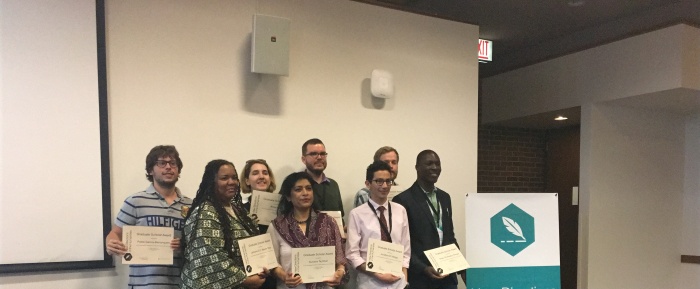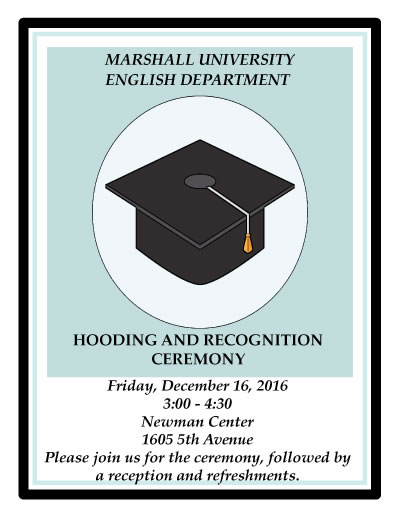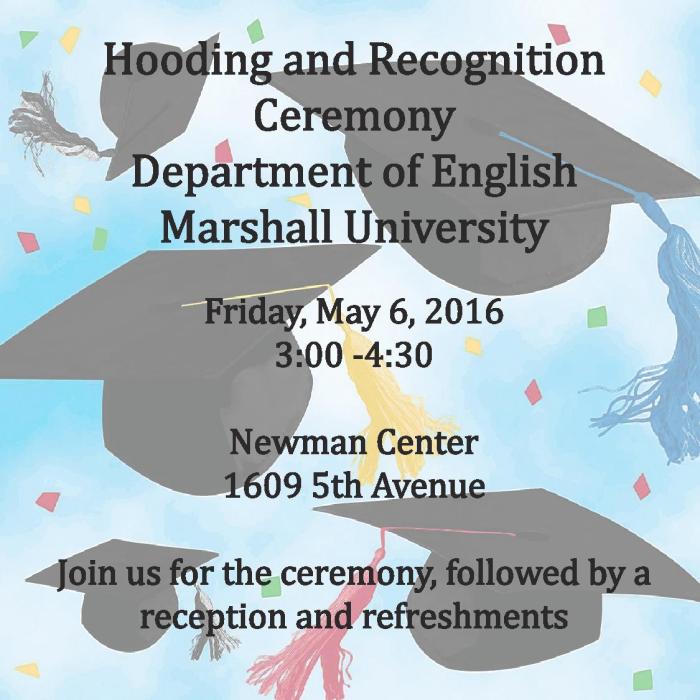All of your Marshall English M.A. material (including student and faculty resources) has been added to the Department’s official website. Thank you to Jackson Armstrong (M.A., 2016) for making the migration possible!
Author: Kristen L
Fall 2017 Course Descriptions
| ENG 560: Writing Center and Composition Theory | ||
| Prof. Anna J. Rollins | Section 101 (CRN 2225) | MWF 11-11:50 |
| This discussion-based, writing intensive course will provide a survey of critical texts in writing center and composition theory. We will be reading each week about the following topics within the field: writing center history and pedagogy, ESL tutoring, intertextuality, composition theory and pedagogy, rhetoric, genre, identity politics, research and documentation, and cultural studies. In addition to our work in the course, you will also tutor for one hour/week in the Writing Center for course credit. You will complete reflective responses each week connecting your course readings and your tutoring experiences. Likewise, you will be taught how to develop practical tutoring and teaching activities that apply your theoretical readings to a tutoring situation or a classroom. The course will culminate with a major research project where you will conduct in depth research on a topic of your choice within the fields of writing center and composition theory. | ||
| ENG 476/576: Structures of the English Language | ||
| Joni Magnusson | Section 101 (CRN 2227)
Section 102 (CRN 2228) |
TR 9:30-10:45
WEB |
| English 476/576 is a study of the structures of English grammar, including parts of speech and punctuation, and of the forms and functions of these grammatical structures. This course investigates how the structures of English grammar are used, learned, and taught by speakers/writers and gives students a deeper understanding of the English language through examination of a variety of special topics related to the structure of English, including language acquisition, English language learning, dialect variation, code-switching, and the history of English. This course also allows students to analyze how an understanding of each of these special topics informs and affects English education practices and prompts them to generate philosophies of grammar teaching and learning. | ||
| ENG 630: Materials and Methods | ||
| Dr. John Young | Section 101 (CRN 2231) | M 6:30-9:00 |
| English 630 introduces M.A. students to the study and practice of literary scholarship, yielding sufficient preparation to produce graduate-level papers and other work. We will cover the basics of bibliographical research and survey the range of theoretical approaches and techniques behind literary interpretation, comprising the “materials” and “methods” of the course title. While theory is often seen as “outside” of literature proper, and thus as imposing “external” concerns onto literary interpretation, this is a misunderstanding: used correctly and effectively, theory should be a tool that enables new kinds of questions about literature (defined broadly) to develop. As Stuart Hall (a theory and critic of postcolonial literature and culture) writes, “Theory is always a detour on the way to something more important.”
This class also serves as an introduction to graduate study, so we will cover such practical topics as: submitting an abstract to a scholarly conference, readying an essay for journal publication, preparing a CV (an academic résumé), teaching literature to undergraduates, applying to Ph.D. programs, and more. Requirements will include a series of short responses to theoretical readings, an in-class oral presentation, and a research paper applying theoretical term(s) and method(s) to a primary text (construing “text” broadly). |
||
| ENG 635: Major Texts: Melville and Conrad | ||
| Prof. John Van Kirk | Section 101 (CRN 2232) | M 4-6:20 |
| Forget everything you’ve heard about “the death of the author.” In this seminar considering two of the most influential writers in the history of English prose fiction we will do everything we can to bring the lives of the writers to the forefront, focusing not only on the writing itself but on the question of how great writing gets written. We will read a critical biography of each writer along with several major works, considering, among other things, prose style, the nature of the novel itself, the development of the “psychological” novel, and the relationship between an artist’s life and the art that emerges from that life. | ||
| ENG 661: Studies in Genre: Speculative Fiction: Exploration and Workshop | ||
| Dr. Gwenyth Hood | Section 101 (CRN 2233) | W 4:00-6:20 |
| Speculative Fiction encompasses the genres of Science Fiction and Fantasy, both also subgenres of Fantastic Literature. The “Fantastic” implies literature which examines life as it is not, or at least, as it is not perceived. Speculative fiction has become increasingly prominent in recent times, in part because contemporary literature reflects to keep pace with social change while staying in touch with whatever permanent realities there may be. In this course, students will look at short pieces of Speculative Fiction on a continuum from ancient to modern times, but with the most emphasis on modern developments. Each will write a substantive paper (approximately 15 pages) chosen subgroup, involving the historical development of a theme or subgenre. Then each will choose a personal project, planned at approximately 20-60 pages, due at the end of the semester. This may be either creative (involving short stories or chapters of a novel) or analytical (involving further exploration of works on a chosen theme). Also, students will keep also keep a semiweekly blog, responding to class readings and sharing insights about ongoing projects. | ||
| ENG 675: Professional Topics in Creative Writing | ||
| Prof. Eric Smith | Section 101 (CRN 2235) | T 6:30-9:00p |
| Course Theme: Literary Citizenship | ||
| Writing can be a punishingly lonely enterprise. This course, which the university’s graduate catalogue describes as “a multi-genre study of professional topics on the writing, editing/publishing, and teaching of creative writing in the current literary and job markets” won’t change that fact. However, by writing new work, becoming conversant with the style and conventions of contemporary literary publishing, and discovering professionalization opportunities beyond the page, we may lessen the brunt of such isolation. The emphasis for this course is on the “multi-genre” designation in the description. While we will write and prepare work for publication, such preparation will occur alongside (and often be subordinate to) a conversation and a writing practice which includes a variety of other publishable works—including book reviews, author interviews, grant and fellowship opportunities, and other types of writing. Our primary goal: to discover a writing practice that recognizes the need for participation in a larger, more public conversation about what, why, and how we read and write. | ||
Incorporating Theory in Scholarly Writing
By Casey Bolt, English B.A. student

On Wednesday, January 25th in Corbly Hall 408, the Graduate Programs Committee sponsored a workshop entitled “Using Theory in Scholarly Writing” presented by Dr. Margaret Sullivan, a professor here at Marshall University. The lecture provided great insights on how to use the different theories (e.g. feminism, Marxism, and psychoanalysis) in scholarly writing, especially writing that looks into the deeper meanings of all sorts of mediums of texts.
At the beginning of the workshop, Dr. Sullivan asked the audience what our difficulties were when it comes to incorporating theory in our writing. Most of us agreed that it was deciding which theory was best to use when analyzing a text as well as wading through all the different articles associated with particular theories.
Our difficulties gave her the opportunity to bring up her fundamental moves in using theory. Her first move, which answers the audience’s difficulty in narrowing down theory, is to focus it. To focus on a theory we need to explore our chosen topics to find what we want our point to be. After this we should condense the theory we want to use down, and then find what we want to be the centrality of our piece and theory. Another suggestion of hers to help with this process is for a person to write like they are writing to a sophomore in college, which means that everything needs to be clarified and easily understood but not overly simplistic as to be redundant.
In her fundamental moves in using theory, her second suggestion is to “own” the theory. When she told her audience this, she explained that it meant to say something about the theory and the text that has not been said before. It is possible for a theory and text to never have been discussed together, but it is only useful to discuss if the theory helps the text and doesn’t just simply “apply, apply, apply.” According to Sullivan and Alexander Doty, an author she quoted from, the text and theory should interweave together and work with one another. This is her last fundamental move in using theory, which is that weaving theory with textual details is key.
She then answered a few questions on what her process is and what she has done. A good starting off point, she said, when using a theory–especially one that you are unfamiliar with–is to read what other people have talked about with the theory. One suggestion she made is to outline the textual material and theory, though she acknowledges that everyone should find the method that works for them. However, she also pointed out that after you have begun writing and you keep writing, sometimes you find a different conclusion than the one you started with. No matter what, though, keeping stuff you have written can be useful, and she says the process of exploration is sometimes an important aspect to finding pieces for your writing. She is not saying everything will be publishable, but that you can learn from the stuff you did not use.
Lastly she did an exercise with us that involved explaining queer theories in Mad Men. She showed a clip from the show and then asked us to give a textual detail and then apply the theory.
Dr. Sullivan did an excellent job giving suggestions and helpful steps on using theory in scholarly writing.
Kickoff to the Semester and New Research Projects: Theory Presentation
On Wednesday, Jan. 25, from 3-4 p.m. in Corbly 408, Dr. Margaret Sullivan will lead the first Graduate Programs Committee event of Spring 2017: a presentation and discussion on incorporating theory into your scholarly writing. This event is perfect for grad students and advanced undergrads working on capstone projects.
Alumni Info Request
English Graduate Students: Fall 2016

Marshall University’s English MA students, Fall 2016
On Wednesday, August 24, Marshall’s English MA students gathered for a beginning-of-the-semester meeting to discuss their curriculum, graduation requirements, important deadlines, and upcoming events. Many of the students gathered at the John Marshall statue following the meeting to take a group photo and celebrate the beginning of Fall 2016. Here’s to a great semester!
Alumni/Faculty Shine at Conference
Three Marshall University English Department alumni—faculty members Sabrina Jones (B.A., 2004; M.A., 2010) and Steven Smith (M.A., 2015), as well as former Graduate Assistant Nathan Rucker (M.A., 2016)—represented Marshall University in June at the 14th International Conference on New Directions in the Humanities that Common Grounds Publishing held in Chicago, Illinois.
Jones delivered a video presentation titled “Foucault Versus the Democratic Discourse: Using Dystopian Literature to Teach the American Dream,” which discussed her use of Ayn Rand’s Anthem and Suzanne Collins’ The Hunger Games to engage students on issues of conformity and democracy and to prompt them to make greater connections across the curriculum as well as in the real world.
Smith presented “Animal Agribusiness and the Pre/Posthuman Condition,” a chapter from his thesis that uses posthuman theory to examine the relationship between humans and nature, focusing on the role of bioethics. Steven’s presentation garnered significant discussion among the various scholars in attendance for the panel.

Finally, Rucker received the Graduate Scholar Award for the conference. As part of the scholarship, Nathan moderated several panels on a variety of topics, ranging from narrative in medicine to the challenges facing female educational managers in Pakistan to a genre study of the 1987 action film, Die Hard.

The participation of these Marshall scholars in the 14th International Conference on New Directions in the Humanities shows that Marshall University fosters a broad and multi-faceted approach to the issues present in various humanities-related fields.
–Nathan Rucker



